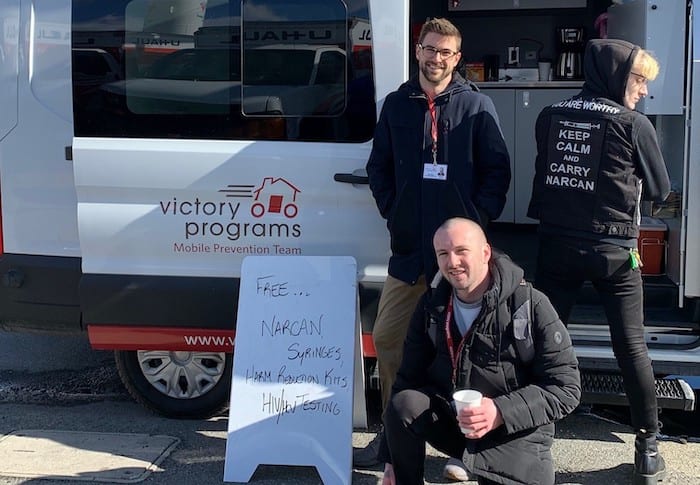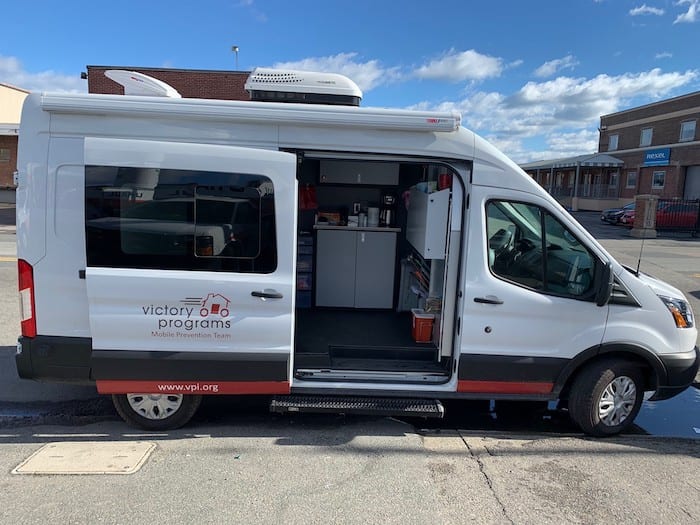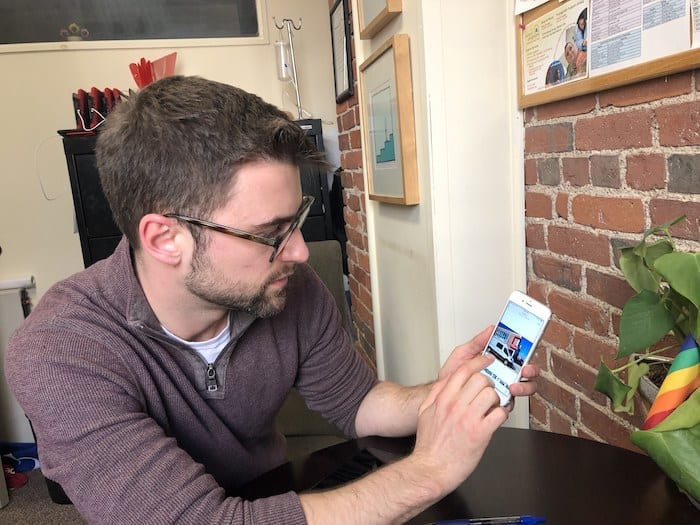
“It’s really important to remember that a lot of the behaviors that existed prior to this are not going to stop because of this, especially when we talk about addiction.”
As many people around Greater Boston self-isolate and practice social distancing from the comfort of their homes, others are still out on the streets and struggling with issues they’ve had since long before the COVID-19 crisis.
In response, an organization known for its work during the HIV/AIDS epidemic is ramping up its efforts to reach the most vulnerable populations by expanding a program that just started this year.
An outreach van program run by Victory Programs is on the road making sure those on the streets not only have access to hand sanitizer, but that they are still being given harm-reduction supplies, including condoms and syringes for safe sex and drug use.
Members of the team will continue to walk certain areas and interact with the homeless on foot, while conducting most of their work in front of the van rather than inside of it.

Rich Baker, the mobile prevention team director, said testing for sexually transmitted diseases and other chronic conditions, such as Hepatitis C, will have to be reduced, since much of that is done on the van. Such adjustments are necessary to prevent close contact in order to protect members of the homeless population as well as van employees.
“Really, the idea is going to be to try to find neighborhoods where there’s the greatest need, but kind of relooking at where we see that need and being as responsive as possible to be able to get out into the community,” Baker said.
Victory Programs is running on a limited supply of hand sanitizer, due to a craze that has people panic-shopping, leaving many shelves across the US empty. As a result, the organization is “also thinking about how we can get more increased access to hand sanitizers and different hygiene products as we get them available to us,” Baker added.
Overall, preparation around COVID-19 does not mean that the organization will take its eye off of issues that continue to impact those who are experiencing homelessness.
Morrigan Phillips, the Boston Living Center’s clinical director of prevention who works with Victory Programs, said the focus will remain on harm-reduction services, which shouldn’t take a backseat to the current pandemic.
“[W]hen things start to sort of close shop or restrict service [or] their access starts to get limited, eventually the supplies people have run out,” Phillips said. “And because [certain] behavior doesn’t change, the social networking is still happening [and] the drug-seeking behavior is still happening.”

According to Phillips, the outreach team noted that the practice of sharing syringes and pipes could be exacerbated if services shut down or alter hours due to restrictions the government has put in place to mitigate the spread of coronavirus. As such, prevention in this theater will require basic precautions to be taken to keep those struggling with substance use disorder or living with HIV or AIDS healthy and informed.
“The guidance right now is Please, don’t inundate the ERs, because what we don’t want to see happen is community transmission occurring,” Baker said, referring to guidance from agencies such as the Massachusetts Department of Public Health.
Other nonprofit organizations are also taking measures to minimize the likelihood of person-to-person transmission.
Pine Street Inn, the largest shelter service in New England, implemented a screening process to ensure guests exhibiting symptoms are taken elsewhere for quarantine before stepping into their facility.
Haley House, which operates the longest-running soup kitchen in Boston, barred onsite consumption days before the governor ordered all bars and restaurants close for 30 days and only allow takeout.
On Monday afternoon, a day after the governor made his announcement—which included a ban on gatherings larger than 25 people—Baker was in touch with the city’s Department of Neighborhood and Development and other service providers, trying to figure out what is needed moving ahead. A main focus of his team’s outreach effort is to keep vulnerable populations informed about what is open and what isn’t; the team will extend its current route from Back Bay to South Station to potentially include Andrew and Codman squares in addition to the Newmarket area which it already serves. But as needs change, that plan could be altered.

Like other service providers, Baker said the prevention team plans may be negatively impacted by COVID-19. Already, a plan to add a doctor or nurse practitioner on the van to provide basic wound care, perform immunizations, and provide flu shots—that was slated to begin this week—hangs in the balance, Baker said.
As the situation remains fluid, Baker said his crew will work to identify the gaps in coverage while keeping in mind the toll this could take on the populations they work with.
“It’s really important to remember that a lot of the behaviors that existed prior to this are not going to stop because of this, especially when we talk about addiction” Baker said. “The risk of relapse increases as social stressors around you kind of pile on, so that’s why we need to be making sure that we’re still getting Narcan out to the community, that we’re still getting access to syringes out into the community—to make sure that a month from now we don’t find new HIV outbreaks that can be traced back to kind of the patterns of behavior that followed COVID-19.”
HELP DIGBOSTON WEATHER THIS STORM AND CONTINUE PROVIDING ARTICLES LIKE THIS ONE
Jordan is a journalist with 7 News and a past president of Society of Professional Journalists-New England.

